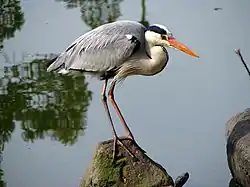garça
See also: Garça
Old Portuguese
Etymology
From Celtiberian *cárcia, from Proto-Celtic *korksā.
Pronunciation
- IPA(key): /ˈɡaɾ.t͡sa/
Noun
garça f
- heron
- 13th century, attributed to Alfonso X of Castile, Cantigas de Santa Maria, E codex, cantiga 352 (facsimile):
- Eſte açor fillaua Garças ⁊ ãades ⁊ Betouros / ⁊ out(ra)s prijões muitas.
- This goshawk caught herons and ducks and bitterns / and many other kids of prey.
- Eſte açor fillaua Garças ⁊ ãades ⁊ Betouros / ⁊ out(ra)s prijões muitas.
- 13th century, attributed to Alfonso X of Castile, Cantigas de Santa Maria, E codex, cantiga 352 (facsimile):
Portuguese

garça (Ardea cinerea)
Etymology
From Old Portuguese garça, from Celtiberian *cárcia, from Proto-Celtic *korksā; akin to Welsh crychydd, Breton kerc'heiz.
Cognate with Galician garza, Mirandese garça, Asturian garza, Spanish garza and (possibly) Catalan garsa.
Noun
garça f (plural garças)
Descendants
- Thai: กระสา (grà-sǎa)
This article is issued from Wiktionary. The text is licensed under Creative Commons - Attribution - Sharealike. Additional terms may apply for the media files.